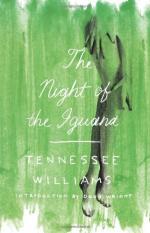|
This section contains 1,144 words (approx. 3 pages at 400 words per page) |

|
In this essay, Gilman reviews a 1962 production of Williams's play, stating calling it the playwright's best work since Cat on a Hot Tin Roof. Gilman concludes that Night of the Iguana's better points make up for Williams's less stellar dramatic offerings.
By now it should be clear that Tennessee Williams' real subject is the painfulness (not the tragedy) of existence, and the fate of human dignity (not of the soul) in the face of suffering. It should also be clear that however neurotic Williams himself may be and however widely neurosis enters into and affects his work, there is little point in looking for the roots of his art, and less in searching out the meaning of any particular play, on one or another categorical Freudian plot of ground; because to Williams everything is painfulsexuality, touch, communication, time, the bruteness of fact, the necessity to lie...
|
This section contains 1,144 words (approx. 3 pages at 400 words per page) |

|




